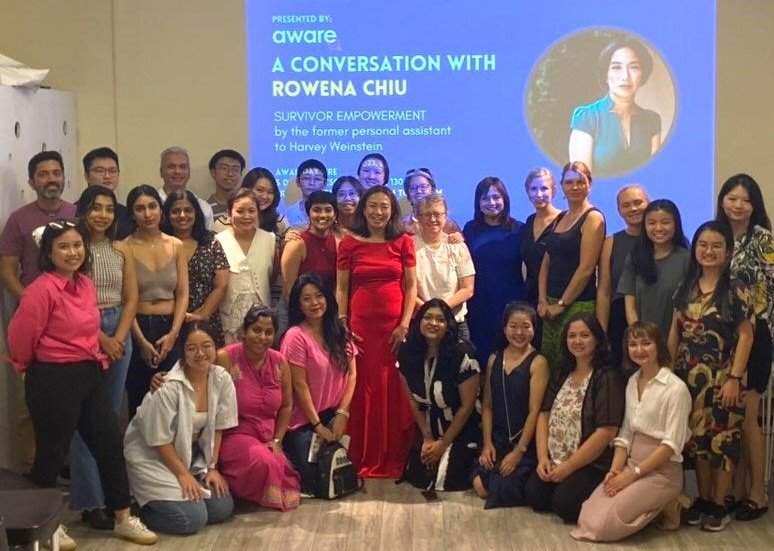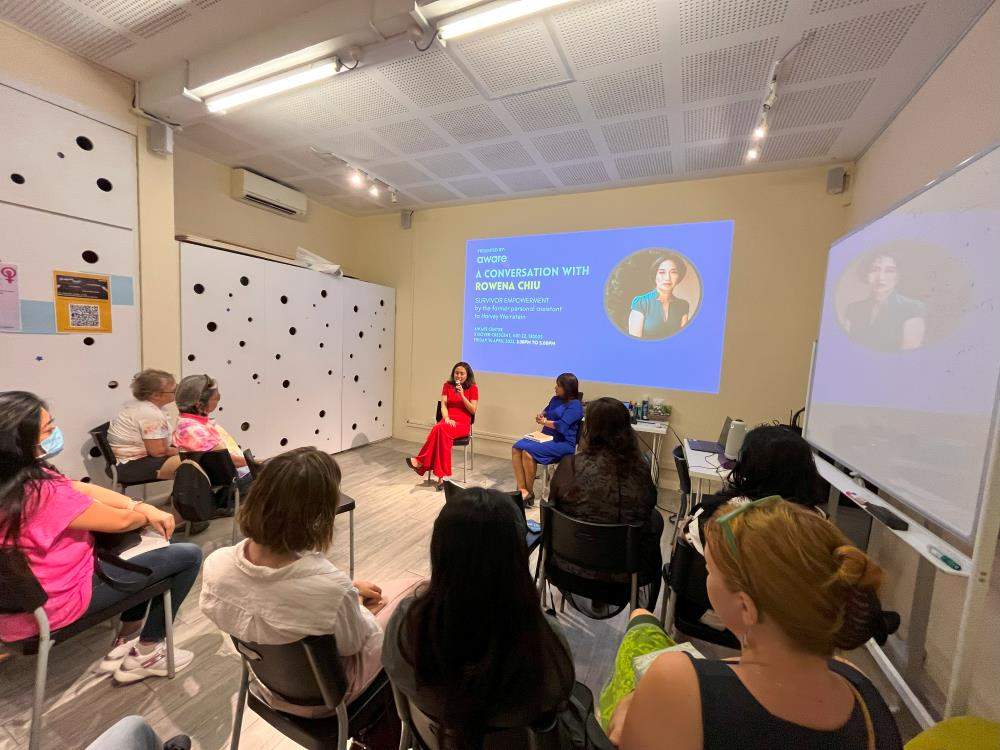-
Advocacy Theme
-
Tags
- Abortion
- Adoption
- Caregiving
- CEDAW
- Disability
- Domestic Violence
- Domestic Workers
- Harassment
- Healthcare
- Housing
- International/Regional Work
- Maintenance
- Media
- Migrant Spouses
- Migrant Workers
- Muslim Law
- National budget
- Parental Leave
- Parenthood
- Polygamy
- Population
- Race and religion
- Sexual Violence
- Sexuality Education
- Single Parents
- Social Support
- Sterilisation
- Women's Charter
A Recap: Conversation with Rowena Chiu
April 24th, 2023 | Employment and Labour Rights, Gender-based Violence, News, Workplace Harassment

Written by Victoria Jagger, intern, AWARE
On Friday, 14 April, AWARE hosted a conversation with sexual assault survivor and advocate Rowena Chiu, during her two-week visit to Singapore. A small group of AWARE staff, members and friends were invited to hear Chiu recount her journey, from experiencing sexual assault at the hands of disgraced film producer Harvey Weinstein while she served as his personal assistant, to coming forward publicly about those injustices as part of the MeToo movement.
For context: On 5 October 2017, The New York Times published a bombshell article exposing Weinstein’s decades of sexual harassment against women in Hollywood. This sparked the global MeToo movement, based on a phrase coined by Tarana Burke in 2006 to empower sexual violence victim-survivors to speak up in solidarity. MeToo had a significant impact in Singapore, too: The last quarter of 2017 saw a 79% increase in calls made to AWARE’s Sexual Assault Care Centre. Later, in 2022, the movie She Said, which portrayed the behind-the-scenes of the Times investigation into Weinstein, featured Rowena Chiu as a character.
Much of the discussion at the AWARE event, which was moderated by Sugidha Nithi, centred on Chiu’s experience of being silenced by a Non-Disclosure Agreement (NDA) after her assault was brought to the attention of others at Miramax, Weinstein’s company, in 1998. Though originally designed to protect Intellectual Property, Chiu explained, NDAs are a civil agreement whose practical uses include the covering up of workplace sexual misconduct.
In detail, Chiu recounted the speed at which the NDA was negotiated and the restrictive clauses it entailed. She said that for one, she was forced to hand over contact details of family, friends and colleagues to whom she had spoken about the incident, to Weinstein’s team, and that the NDA required her to defend Weinstein if any of those contacts let slip about what he had done to her. She was also barred from freely contacting professionals, including therapists, doctors and lawyers, for support.
In the face of this, Chiu and her colleague Zelda Perkins put up a fight. They had their own demands for the NDA: including requiring Weinstein to attend sex therapy, and mandating that future female assistants work in pairs around him, instead of on their own. These, together with a clause demanding that Weinstein report himself to Disney and resign if another NDA was signed within two years, were included in the NDA. Ultimately, though, Chiu and Perkins had no means to ensure these clauses were upheld.
The NDA came to represent, for them, the struggle to hold accountable powerful individuals who had the means to buy silence. “It sealed us into a black hole,” Chiu recalled. Yet in 2019, after nearly two decades, Chiu and Perkins bravely opted to speak out against Weinstein despite being bound by the NDA. Today, Perkins runs a not-for-profit organisation Can’t Buy My Silence, which is working to raise awareness about the operation of NDAs in the United Kingdom, United States and Canada.

Another topic Chiu addressed at length is the difficulty of speaking up after experiences of abuse. Speaking up allows victims to find solidarity and demand equality. It also raises public awareness around sexual misconduct in the workplace, prompting conversations about unacceptable behaviours and encouraging policy change. Speaking up comes in many different forms: for instance, telling a friend or therapist, writing an article or even speaking on national television. Part of the reason why Chiu is so passionate about speaking up, she explained, is that speaking up can be significantly harder for Asian women. This may be due to unyielding family values, a sense of shame and the desire to protect one’s reputation, which take on added weight in Asian cultures.
Chiu is living proof that these obstacles can be overcome and that there is no time limit on speaking out. To date, 116 women have come forward with allegations against Weinstein—and perhaps more will speak out when they are ready.
When asked by an AWARE attendee what the best way is to change systems of abuse, without hesitation Chiu replied: “Accountability for enablers”. She argued that a huge reason why powerful abusers like Weinstein are able to continue behaving poorly is because they operate within systems that permit it. Weinstein, for instance, had a network of accountants, lawyers and board members who enabled his behaviour. This enabling behaviour simultaneously rewards perpetrators’ misconduct and prevents victims from speaking out. Chiu reiterated that in order to dismantle systems of complicity, we need to create policy and legal structures which safeguard against abuse.
One audience member raised a question about backlash to the MeToo movement. In particular, they asked Chiu how she responds to the post-MeToo idea that “men cannot be alone with a woman or even hold a door open for them without being accused of misconduct”. Chiu’s response was plain and simple: “If you are a man who feels like you can’t be alone with a woman at work without having an NDA result, you need to go home and reconsider your life’s priorities.” She added that although asking for consent and respecting it is often made to seem outrageous, these are in fact reasonable asks between members of society.
The final discussion centred around what MeToo means to Chiu personally. She said that the movement isn’t just about responding to individual incidents of powerful older men preying on young vulnerable women—it is concerned with abusive power dynamics, which can affect all people across the gender spectrum. Thus, the MeToo movement exists to support and empower all victim-survivors.
Chiu called herself an ordinary woman, but she is using her voice to bring about extraordinary change. On behalf of AWARE, we thank her for sharing her insights into healing and empowerment after abuse.



